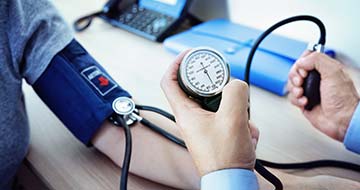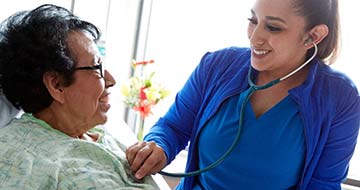Trust the Experts With a Heart
Learning the source of your heart problem is the first step in understanding how it can be fixed. When you choose Valley Baptist Health System as your heart care provider, you will work closely with our dedicated team of cardiovascular specialists, cardiovascular
surgeons, nurses, other healthcare professionals and staff in Brownsville, Harlingen and Weslaco.
Each member of your heart team will attend to your specific needs, carefully explaining the treatment options suitable for your condition
while making you feel as comfortable as possible. If you are experiencing symptoms of a heart condition, the cardiovascular specialists at Valley Baptist Health System use noninvasive cardiovascular testing methods to get more information about your
condition with less pain and less risk of infection or complications.
You can schedule an appointment for noninvasive cardiovascular testing by calling us at 855-720-7448. Be sure to follow your heart specialist’s orders before
testing and wear comfortable clothing and shoes.
Why Is Cardiovascular Health Important?
Heart disease remains the leading cause of death in the United States, causing 1 in 4 deaths. This is why we encourage everyone to protect their heart health by consuming a heart-healthy diet, exercising regularly, scheduling regular heart checks, seeing
a cardiologist in Harlingen, Brownsville or Weslaco and more.
What Is a Cardiovascular Specialist?
With at least 10 years of education and clinical training, a cardiovascular specialist is a physician specializing in diagnosing, treating, and preventing various conditions related to the heart, arteries, and veins. Heart specialists must pass a cardiology
exam by the American Board of Internal Medicine (ABIM).
To detect issues in the cardiovascular system, diagnose heart conditions and determine the best treatment options, a heart specialist reviews each patient’s medical history and
family health history, conducts physical exams, carries out tests and performs procedures if needed.
What Are the Most Common Cardiovascular Diseases?
Here are the five most common cardiovascular diseases and their symptoms:
1. Arrhythmia
Arrhythmia is also known as irregular heartbeat. It occurs when the heart’s natural pacemaker develops an abnormal rhythm. When the heart beats too slowly (bradycardia), too quickly (tachycardia), too early (premature contraction) or erratically
(fibrillation), it cannot effectively pump blood throughout the body, which may cause internal organs such as the lungs and brain to shut down.
Some types of arrhythmia go away on their own. But if it lasts longer, medical intervention
may be required to keep it from becoming life-threatening. It may even lead to stroke. Some of the symptoms of arrhythmia include the following:
- Chest pain
- Dizziness or lightheadedness
- Fast or slow heartbeat
- Shortness of breath
- Skipping beats
- Sweating
2. Heart Failure
Heart failure is also known as congestive heart failure. With heart failure, the compromised heart cannot supply enough blood and oxygen that the rest of the body needs to function correctly. The heart tries to stretch for stronger contractions to pump
more blood which then enlarges the heart and causes it to develop more muscle mass. As a temporary measure, the body will then divert blood away from other tissues and organs such as the kidneys. Eventually, this may no longer be enough. Some symptoms
of heart failure include the following:
- Difficulty in doing daily activities, such as walking, climbing the stairs or carrying groceries
- Fatigue
- Shortness of breath
- Swelling of the feet, ankles, legs, abdomen or neck veins
3. Stroke
Stroke happens when the blood flow to your brain gets blocked, keeping the brain from getting enough supply of nutrients and oxygen. Stroke is a medical emergency because brain cells may die within minutes without nutrients and oxygen. This may cause
long-term disability, brain damage or even death. Sudden bleeding in the brain may also cause a stroke.
Stroke has various symptoms depending if it’s an ischemic stroke, hemorrhagic stroke or transient ischemic attack (a.k.a. a mini-stroke).
But some of the most common symptoms include the following:
- Sudden dizziness
- Sudden difficulty in seeing using one or both eyes
- Sudden loss of balance or coordination
- Sudden numbness or weakness (may be in one side of the body)
- Sudden severe headache
- Sudden trouble speaking, slurred speech or confusion
4. Heart Valve Problems
The heart has four valves: the aortic, mitral, pulmonary and tricuspid valves. These valves have tissue flaps that help ensure your blood flows correctly through the heart’s four chambers and to the rest of the body. Heart valve disease arises when
at least one of these valves does not function as it should.
The symptoms of heart valve disease may differ from one person to another. Some people may display no symptoms, while more severe cases may experience noticeable symptoms and
can develop very quickly. Signs of heart valve disease may include any of the following:
- Chest pain
- Fainting or lightheadedness
- Fatigue, weakness or inability to maintain regular activity level
- Palpitations (rapid rhythms or skips)
- Shortness of breath
- Swollen ankles, feet or abdomen
5. Heart Attack
Heart attack, also known as myocardial infarction, may arise when a part of the heart muscle doesn’t receive enough blood. It can be sudden and intense or start slowly with mild pain or discomfort. Often, those affected aren't sure what's happening
and wait too long before getting help. A heart attack is life-threatening, so if you or a loved one experiences symptoms, please dial 911 immediately. Heart attack symptoms may include the following:
- Chest discomfort
- Cold sweats
- Discomfort in the upper body
- Nausea or lightheadedness
- Shortness of breath
According to the American Heart Association, as with men, women’s most common heart attack symptom is chest pain or discomfort. But women are somewhat more likely than men to experience some of the other common symptoms, particularly shortness of
breath, nausea/vomiting and back or jaw pain. Other heart attack risk factors include heredity and increasing age. For heart attack diagnosis and treatment, consult one of our cardiologists at Valley Baptist Health System.
What Are the Cardiovascular Disease Treatment Options?
Our cardiologists in Brownsville, Harlingen and Weslaco may recommend several treatment options based on your specific condition. These may include any of the following:
- Lifestyle changes (i.e., avoiding alcohol consumption, being physically active, consuming healthier foods and drinks, limiting stress, quitting smoking, etc.
- Prescription medication (i.e., blood thinners, diuretics, nitrates, statins, etc.)
- Traditional surgery or minimally invasive procedures (i.e., angioplasty, heart bypass, heart transplant, etc.)
When to Consult a Doctor
We recommend seeing a cardiologist if there is sudden chest pain and if the pain doesn’t ease. Call 911 or go to any Valley Baptist Health System heart hospital in Brownsville, Harlingen or Weslaco if you experience the following symptoms:
- Pain that spreads to the arms, back, neck or jaw
- Tightness or heaviness in the chest
- Pain that starts with nausea, vomiting or sweating
- Difficulty breathing
- Blue lips or nails
- Severe pain that lasts longer than 15 minutes
- Confusion







